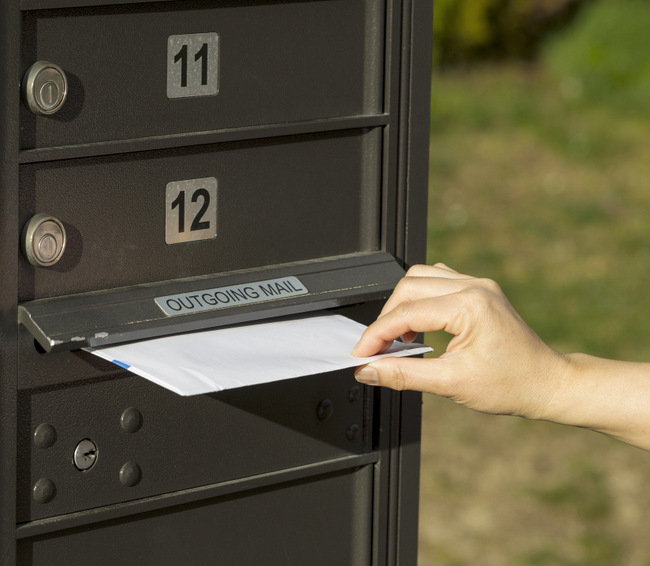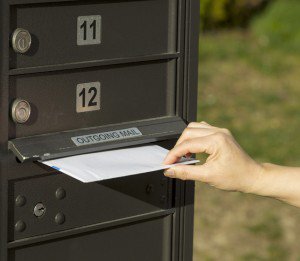
The House of Representative s will soon vote on a bill that may centralize mail deliveries at apartment buildings and alter delivery schedules.
s will soon vote on a bill that may centralize mail deliveries at apartment buildings and alter delivery schedules.
We’ve all seen the change taking place. The postal service became known as “snail mail” the moment that email reached most American households. Online bill pay let us settle balances with the click of a mouse rather than the lick of a stamp–or by gingerly tapping our mobile touchscreens. During travels, we began posting pictures and status updates via social media rather than sending postcards. Many of us can’t think of the last time we entered a USPS. The FedEx and UPS locations seemed to be much more convenient and efficient.
When we sit back and think about it, few of us are really surprised that the United States Postal Service is in a crunch. Americans simply don’t use the mail system like we used to. In order to stay afloat, Congress deliberated multiple times to determine the future of USPS. Major changes will be made, many of which affect multi-family firms and their tenants.
Regular mail delivery could be shortened to five days per week or fewer, though Saturday deliveries will remain protected for at least one year after the enactment of the bill, if it passes. Approximately 125 post offices will eventually close, though the bill has provided a lifeline to an equal quantity of processing centers that were heading to the guillotine to cut costs.
For multi-family firms and renters, though, one change holds the greatest impact: the new plan aims to create centralized delivery services particularly for apartment communities. This may create challenges for leasing offices and added inconveniences for renters.
Hurdles for pre-existing leasing offices:
- Storage Leasing offices would need to prepare a designated, secure location to store residents’ packages, some of which may be fragile.
- Staffing Office staff must train at least one staff member to sign for packages, store them, and release them to the appropriate party. For smaller complexes, this may require hiring additional team members.
- Notification Systems A system should be in place to notify residents that they have a package. This may include a phone call, email, text, or a note on the mailbox or door of package owner.
- Security Leasing offices will be known to house packages that may be valuable. This could increase the likelihood of thefts. Unlike confidential resident info which may be secured using staff credentials for network log-in, packages may be less secure if stored in an area that is accessible to more than one staff member or residents.
- Pick-up policy Many offices may find it useful to adopt a pick-up policy, complete with a required photo identification and signature. Such procedures could create a problem for residents without ID, such as children or the elderly. Staff may want to consider the creation of a consent form that authorizes pick-up by another party such as a partner, roommate, or neighbor.
- Parking Parking is often scarce around leasing offices. A few designated visitors spots and a few spots for staff leave little room for the wave of cars that will arrive post-rush hour. Leasing offices will need to get creative about accommodating residents who arrive to retrieve packages.
Many newer apartment communities, particularly luxury living accommodations, already have a centralized mail system in place for residents. Such sites were created with this amenity in mind, foregoing the rush to comply and adapt their current operations.
Leasing offices that do not have mail systems entact could learn from student housing. Many campuses implement a form of centralized mail delivery for dorms. Their systems account for many of the challenges listed above and could be used as a guide.
Hurdles for tenants:
- Scheduling Pick-up times will be restricted to when the leasing office is open, which may not correspond with tenants’ busy lifestyles.
- Privacy Curbside or door step delivery isn’t exactly confidential but putting a face with a package removes most elements of privacy.
- Inconvenience For large complexes, a trip to the leasing office isn’t a simple walk. It can be time consuming.
Admittedly, residents will be the least affected. In fact, they stand to receive benefits from a centralized system. Tenants can enjoy the added security of the centralized delivery. Instead of hoping that package will still be sitting at the thresholds of their doors when they get home, residents will have a potentially more secure location for picking up their mail. Packages will also be protected from the elements, minimizing damage from rain and extreme temperatures.
To date, the bill has yet to reach the House floor. Stay abreast of developments on Committee on Oversight and Government Reform.


